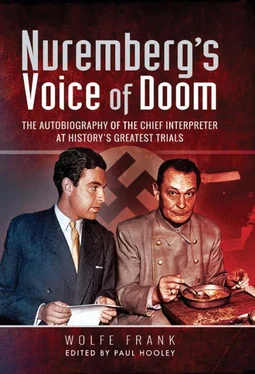
17. ARREST AND INTERNMENT
BESIDES LIVING VARIOUSLY AT MY LONDON APARTMENT and on my boat on the Thames I also rented a large property, known as ‘The House on the Creek’ in Maidenhead where Pat and I often stayed until Maidenhead was declared a ‘protected area in which enemy aliens, even friendly ones, were not allowed to reside’. I had been keeping my boat nearby, so I loaded my two radio sets and my bicycle onto the boat whilst a friend, Jimmy Harwood, drove my car to the White Hart Hotel at Sonning on Thames, a few miles up-river and out of the ‘protected area.’
Our timing was quite perfect. I tied up my boat and Jimmy arrived a few minutes before opening time. ‘Two pink gins’ we said.
‘This is the six-o’clock news.’ crackled a voice on the radio over the bar. ‘With immediate effect enemy aliens are prohibited from owning or using motorcars, boats, bicycles and radio sets.’
‘Ch… ch… cheers’ said Jimmy ‘I suppose you’ll be allowed to keep your shoes on.’
To do justice to the Chief Constable of Berkshire, it must be said that I applied for and was granted an exemption from that order.
Five weeks later however, on the glorious, beautiful morning of 26 June 1940, I emerged from my bath whistling and ready to travel to London for lunch with a particularly nice and attractive young woman when I found two large gentlemen waiting for me in my room.
‘Good morning sir,’ said one. ‘I suppose you know what we’re here for?’ I confessed I had no idea. ‘We’ve come to detain you,’ he said cheerfully.
I sat down. Then I asked a lot of questions. ‘Yes,’ I was told, ‘every enemy alien in England was to be detained.’ Did they think I would be detained for long? – ‘Definitely not, only for a few days.’ Could I telephone? ‘No, unfortunately.’ Could I take luggage? ‘Certainly. But it would be silly to take too much, since I would soon be back.’ I told them about my lunch date. They promised to let her know and trotted off to the telephone.
I packed as much as I could get into a fairly large suitcase and was taken in a police car to ‘a secret location’ – which turned out to be Wokingham Police Station – where I was put behind locked doors.
A police constable entered to enquire if I had had breakfast? I hadn’t. He took some money and returned a few minutes later with a tray on which I found tea, toast, butter, marmalade and a boiled egg under an egg warmer in the shape of a chicken’s head. I could not help but laugh – that egg warmer seemed to be a ludicrous touch under the circumstances.
During the hour I spent alone in that room, I took stock. I had preserved my freedom by fleeing from Germany but had lost out to the British. I had got rid of my German nationality and would remain stateless for the duration of the war, whist my naturalisation application remained suspended.
I stared at the locked door of my private suite – the way through it into the British Army looked quite impossible. The ground had, very effectively, been pulled from under my feet. I felt scared, mistreated, victimised and extremely angry. However, I also resolved that I would emerge undamaged and triumphant, in fact the victor, over all these injustices and those who created them.
Both the principle and the methods used to intern those of us who had fled from Nazi terror – whom the British had conveniently labelled ‘enemy aliens’ – became the subject of much criticism in England, and elsewhere. That criticism could be heard in Parliament and read about in the Press and it will always remain one of the less glorious chapters in the history of a nation that is generally so very humane; but which can, at times, also be extremely cruel.
It was foolish for anyone to expect plans to be ready for the internment of 40,000 of Hitler’s arch enemies in a country which was altogether unprepared for war and did not have enough anti-aircraft guns to hold off enemy planes. It was also quite unreasonable to think that this was the way to control enemy aliens and make a Fifth Column [1] A fifth column is a clandestine group of people whose objectives are to undermine a larger group from within.
in England impossible, and to then demand the immediate internment of those aliens in order to be certain.
Those in authority should have realised much sooner than they did that the aliens were themselves enemies of the same regime the British were fighting and included amongst their number racial and political refugees many of whom had already suffered in Hitler’s prisons and concentration camps. It should also have been obvious that, properly employed, we could make a considerable contribution to the war effort of a country desperately short of manpower.
Yet instead of using us to the limit, we were antagonised to the limit. For over two years, expert workers in every possible field of science and production, as well as young fighting-fit men, wasted their time behind barbed wire fences or in digging holes in the Pioneer Corps.
Much later, of course, we were allowed to do our share and not one single case became known which might have justified the ill-advised ‘caution’ that had been applied, and the lack of understanding and generosity continued even after we had become fully-fledged members of the British Armed Forces. We could not apply for British citizenship during the war, yet officers and men in some of the finest regiments in the British Army had earlier been classified as enemy aliens. Germans were running the risk of being taken prisoners by Germans. British medals were pinned on German chests.
Finally, at the end of the war, those who joined the armed forces were given priority for naturalisation. However, they first had to be approved by an ‘Inter Service Naturalisation Board’ – men who had fought in the front line for the British Army were vetted by a panel of staff officers to see if they were suitable to become British Citizens.
Seething as I was that day in June 1940 I had been re-assured by my friendly police escort that my discomfort would be all over in just a few days. My dismay only increased however as more internees began to arrive and eventually some fifteen of us were transferred to the army barracks at Reading where preparations for our arrival had not been well planned. Each man was issued with two trestles, three boards and some blankets – to be used as a bed – and it soon became clear that the Army personnel had no idea who we were, nor did they have any instructions regarding our treatment. They did not know whether we could write or receive mail or even notify family or friends as to our whereabouts.
I looked closely at the other men in the group, which had grown to over a hundred. It included all ages, from eighteen to sixty-five years. Some of the older men were sitting on their beds, head in hand, unable to grasp what had happened. Many were former inmates of Nazi concentration camps and they were unable to remain rational in the face of this renewed imprisonment after what they had already suffered.
We sat about dejectedly for the rest of the day and I eventually managed to persuade a young Private to take some of our money to the camp canteen, where he bought essentials for those who had brought none with them. The night was spent, rather uncomfortably, on wooden boards without mattresses.
Early the next morning I was called out. Humphrey Sykes, who had come back to England at the outbreak of war and had been through the Dunkirk evacuation, was waiting for me. The owner of the White Hart Hotel had kindly called our company office to tell them what had happened to me and Sykes had traced me to Reading. He knew the Commandant of the camp who gave his permission for us to meet. However, Humphrey had only bad news. He had contacted everybody he knew in an attempt to get me out but had been told ‘all aliens were IN and they would stay IN.’ We were given just half an hour to settle our affairs. I gave Sykes authority to process my resignation from the boards of our two companies and he left, looking dejected and guilty, uttering the most unbelievable platitude I had ever heard. ‘The darkest hours,’ declared Humphrey, looking every inch the priest in cavalry officer’s clothing, ‘are always those before the dawn’, thus providing me with the first good laugh since the chicken head egg warmer incident.
Читать дальше













